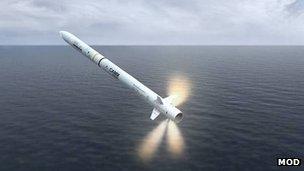Filton company awarded 拢483m missile contract by MoD
- Published

The Sea Ceptor concept will replace the Sea Wolf air defence system
A missile systems company based in Filton near Bristol has been awarded a 拢483m Ministry of Defence contract.
MBDA UK will work on the new Sea Ceptor Royal Navy defence system which aims to intercept and destroy enemy missiles travelling at supersonic speeds.
The contract will sustain about 500 jobs in MBDA's Filton facility and its production bases in Stevenage, Herts, and Lostock in Bolton.
Work is expected to last for around five years.
MBDA's UK managing director Steve Wadey said: "This contract ensures that with Sea Ceptor, the Royal Navy will have the best equipment to protect its ships and crews against the growing threat.
"It is a powerful example of how industry and the MoD can deliver together an advanced capability that meets military needs in the most cost-effective manner.
"It is also highly significant step in advancing and sustaining the UK's mastery of complex weapons technology."
The Sea Ceptor has initially been designed for use on the Type 23 frigate ship and will replace the Sea Wolf air defence system which is to go out of service in 2016.
Sea Wolf, which has been used by the Royal Navy since 1979, was originally built and designed by the British Aircraft Corporation (BAC) which later became MBDA.
Mach 3
The Sea Ceptor concept uses a missile capable of reaching speeds of up to Mach 3.
It will have the ability to deal with multiple targets simultaneously, protecting an area of around 500 square miles over land or sea.
The Sea Ceptor will also be fitted on the new Type 26 global combat ships currently being developed.
Its flexible design also means that it could be adapted for future use by the Army and RAF.
Minister for Defence Equipment, Support and Technology, Peter Luff said: "The development of this missile system is a huge boost to the UK's world-leading missile industry and once again proves our commitment to providing battle winning technology to our armed forces.
"The introduction of this cutting edge missile system will not only ensure that the Royal Navy will be able to continue protecting our interests wherever they may be, but is also highly significant in sustaining and developing the UK's skill in building complex weapons."